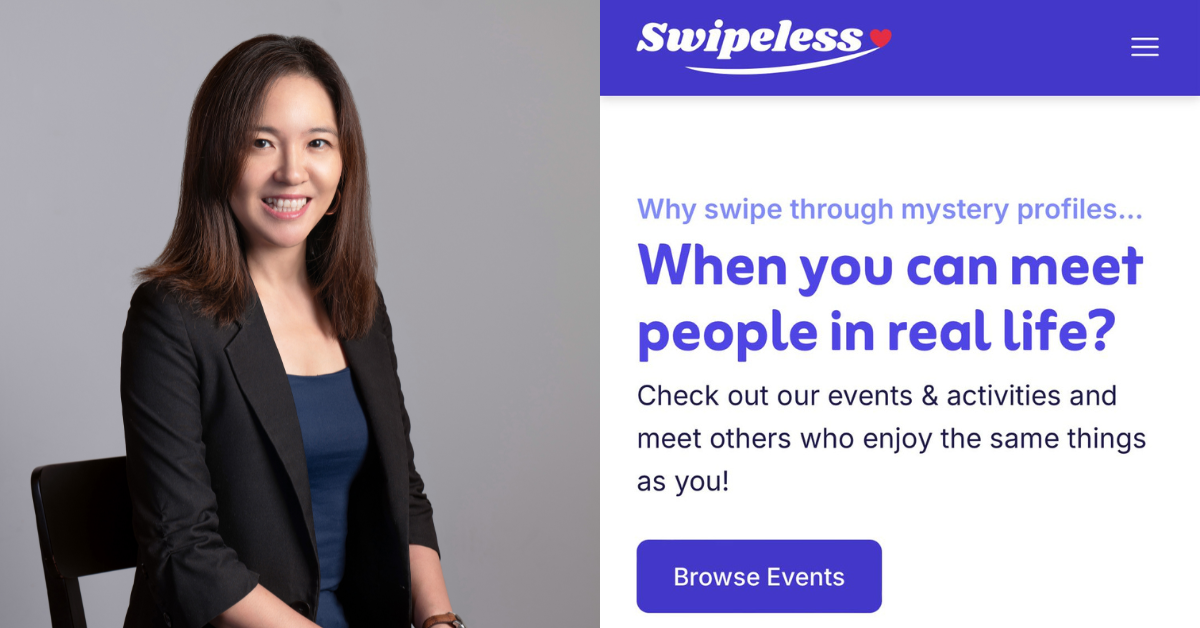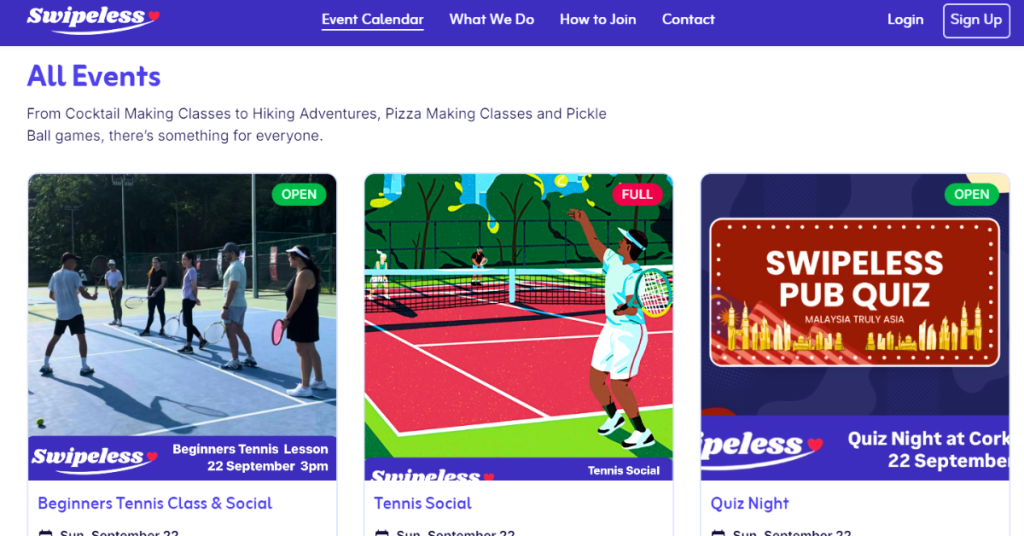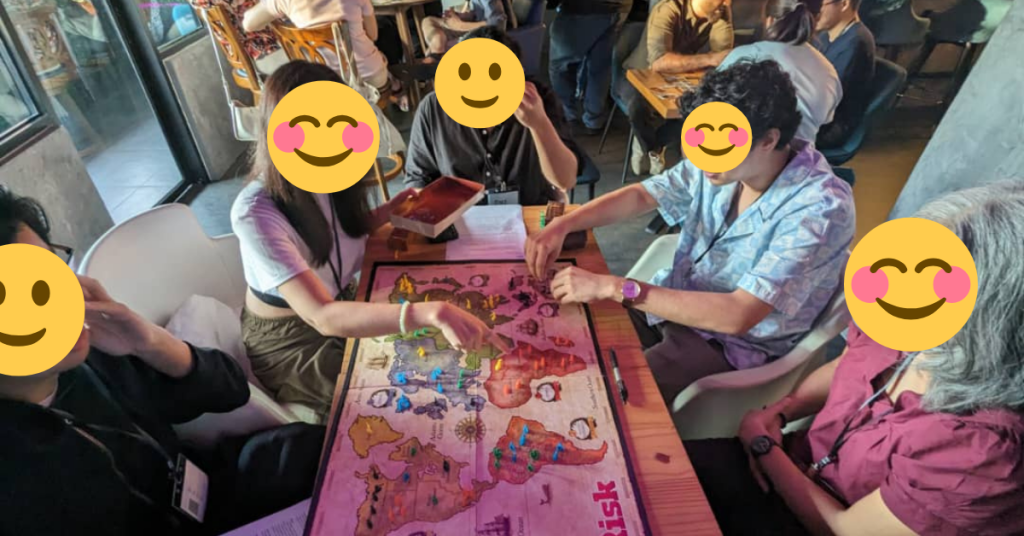She started a dating platform that encourages M’sians to “swipe less”, aims to scale globally
Swipeless is a Malaysian community platform that organises activities for like-minded singles to meet naturally.

Like many things, dating has become highly digitalised in modern society. Dating apps are commonplace, with people “sliding into DMs” regularly to connect with strangers.
One of the platforms in Malaysia that wants to change this is Swipeless.
As its name suggests, Swipeless wants people to swipe less and instead make dating offline again. This is how it’s doing that.
A wealth of experience
First, let’s meet the entrepreneur behind Swipeless—Shan Li.
With a background in banking and finance, she began her career with PwC London as an auditor, and later joined CIMB Group.
During her 12-year stint with CIMB Group, she co-founded a business called Babydash, a mum and baby ecommerce platform that was among the first to raise funds via equity crowdfunding (ECF).
In 2014, she left CIMB to grow Babydash. After four years, though, she realised she wanted to be involved in more than just ecommerce.
At that point, big ecommerce players like Lazada and Shopee had entered Malaysia, and competition was very high. So, Shan Li sold her shares to her partner and co-founder, and went on to start an accelerator and VC in Malaysia.
And that’s how Scaleup Malaysia got its start. Today, it has investments in close to 40 startups across various industries.
With Scaleup Malaysia currently in portfolio management mode and not actively investing, Shan Li’s main focus today is on her own startup—Swipeless.
More on swiping less
The idea for Swipeless comes from Shan Li’s own experience of being single. Using dating apps to try to meet new people, she found them difficult to navigate, and the time spent on them rarely translated into meeting people in real life.
“I started searching for singles activities in KL but couldn’t find activities which were specifically organised for singles to attend—other than speed dating or matchmaking events, which I was not interested in,” she explained.
Rather, Shan Li wanted to learn new things or play a sport while naturally meeting other single people.
 Image Credit: Swipeless
Image Credit: SwipelessSo, she started a Google Form asking people whether they would join a platform with a whole host of different activities for singles. She also got their input on activities they’d want to join.
Very quickly, she got over 100 responses, which showed that there was a need for something like this. With that validation, Shan Li began organising activities, and people started attending them.
“We’ve come a long way since then, and have been trialling and testing as we go along, learning from each activity and event,” she said.
 Image Credit: Swipeless
Image Credit: SwipelessNow, Swipeless exists as a platform that connects people in real life based on activities and interests, using online and offline data to help people make better connections. The thinking is that like-minded people will attend the same type of events.
Activities they host include pickleball socials, tennis meetups, boardgame nights, quiz nights, karaoke sessions, murder mystery nights, hiking, live music events, pizza making workshops, and many more.
Post-event, Swipeless gathers data about how much a user enjoyed the activity and whether they would like to connect with anyone from that event, be that romantically or platonically.
Using this data from users, along with things like attendance history, Swipeless aims to build an algorithm that recommends relevant events and activities.
“We are basically trying to help people connect better in real life, instead of spending time swiping on the dating apps,” she said. “With Swipeless, you can’t connect with someone until you meet them at an event and then you can connect and continue chatting after that.”
Monetising meetups
Aside from facilitating connections, Swipeless also has a marketplace component that empowers the gig economy.
Each Swipeless event is hosted, priced, and run by different Swipeless hosts, who can make a profit from the event and pay Swipeless a platform fee.
This model allows for the business to scale and serve large numbers of users across multiple cities concurrently.
 Image Credit: Swipeless
Image Credit: SwipelessAside from that, Swipeless has two revenue streams. One is through events, whereby participants will pay a fee for joining an even. Then, there’s a subscription revenue which will be launched after the matching function is introduced.
So far, Swipeless has not raised any money. Having bootstrapped the initial capital, whatever is made from event revenue is reinvested into the business.
That said, the team aims to raise RM1 million to build out the technology to where they want it to be. 40% of that would go to sales and marketing spend, 30% on product development/technology, and 30% on building the team.
“With this amount raised we will be able to scale to a second city and aim to be able to charge subscription fees by then,” she said.
As they’re focusing on building the business, they have not raised the full RM1 million yet, but have received commitments from a few people and will be speaking to more angel and early-stage investors.
Closing the loop
With the current era of dating app fatigue, though, Swipeless is definitely not the only platform organising in-person events. Another similar startup we recently covered is Date Well Project, for example.
But Shan Li believes Swipeless sets itself apart because of the variety of events and activities it offers. Plus, it makes use of data and technology to connect people.
“In comparison to speed dating or matchmaking events which can sometimes feel like an interview or popularity contest, our events and activities are designed to lower that pressure of meeting new people, and bring people together around something they can already enjoy,” Shan Li said.
 Image Credit: Swipeless
Image Credit: SwipelessBut can Swipeless really replace dating apps? To that, Shan Li doesn’t see Swipeless and dating apps as mutually exclusive, rather, she believes dating apps will have to evolve and look for complementary in-person solutions.
Thus, the objective is to build Swipeless fast and big enough to be seen as a viable acquisition target for dating apps, as a business model that closes the loop to connect people better.
That said, she believes there are enough people who are interested in this style of meeting people that the business can be profitable on its own. So far, Swipeless has hosted over 50 events and has over 800 users.
In terms of their demographic, 59% are women, with more than 70% aged between 30 to 50 years.
“This does jive with our initial thoughts that adults, especially those over 30, find it harder to meet and make new friends, simply because they have settled into a social pattern and existing social circles,” she said.
Currently, Swipeless runs a tight ship with only four team members. Other than Shan Li, the management team includes Singapore-based CPO Brendan Millar and CMO Annuar Aziz, another ex-banker.
 Brendan Millar and Annuar Aziz / Image Credit: Swipeless
Brendan Millar and Annuar Aziz / Image Credit: SwipelessWith this lean team, the immediate goal is to reach 1,000 paid subscribers and to launch in a second city.
In the longer term, they aim to be an in-person connections platform, connecting singles around the world through in person events and activities.
“We are really using KL as a pilot city and test bed to test the market and build our platform with a global and multi-city mindset,” Shan Li said.
True to her background, the founder is building Swipeless with scalability in mind, aiming to grow the platform into something much bigger, connecting people in-person across the globe.
Learn more about Swipeless here. Read other articles we’ve written about Malaysian startups here.Featured Image Credit: Swipeless

 Troov
Troov 
































